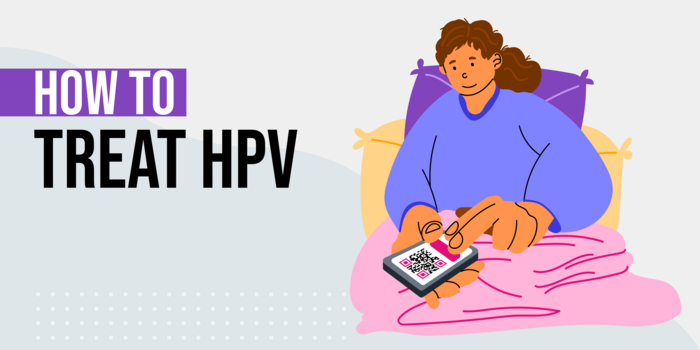Key points
- HPV, a common virus, can cause warts and increase the risk of certain cancers.
- HPV spreads through skin-to-skin contact, including sexual contact, even without symptoms.
- Home remedies for HPV include tea tree oil, witch hazel, green tea, garlic, apple cider vinegar, and certain nutrients.
- Preventive measures against HPV include not picking at warts, using condoms, and getting the HPV vaccine.
- Preventive measures against HPV include avoiding wart picking, not biting nails, wearing shoes in public pools and locker rooms, reducing the number of sexual partners, using condoms, and getting vaccinated.

How is HPV Spread?
HPV spreads through skin-to-skin contact with an infected person, according to the Mayo Clinic. Genital warts that are caused by HPV are spread through sexual contact, which includes:
- Vaginal intercourse
- Anal intercourse
- Oral sex
- Fingering
The Mayo Clinic also notes that HPV can spread without intercourse or ejaculation, and can spread even if your partner has no symptoms.
Symptoms of HPV
Most cases of HPV have no symptoms, according to the Mayo Clinic. However, when symptoms do occur, it is in the form of warts, including:
- Genital warts
- Common warts
- Plantar warts
- Flat warts
How to Treat HPV
1. Tea Tree Oil
Tea tree oil is used for a variety of skin conditions, including warts, according to Medical News Today. They note that tea tree oil shouldn’t be used on genital warts because it can irritate the sensitive skin of the genitalia. However, tea tree oil may be effective for warts on the hands and feet. They recommend mixing the tea tree oil in a small amount of carrier oil (like olive oil) first.
2. Witch Hazel
Witch Hazel is relatively mild, making it a great option for people with sensitive skin, according to Medical News Today. However, it still may be irritating to the mucus membranes of the vagina or anus, so they recommend not using it in those areas.
3. Green Tea
There is some limited evidence that green tea may help treat genital warts, according to Healthline. Using a topic green tea extract may be the most effective, they note.
4. Garlic
Garlic is used for several medicinal purposes, according to Medical News Today. Some people believe it is a great remedy for skin warts, however, only small studies show some successful results. Healthline notes that you could apply garlic extract directly to your warts or soak gauze pads in a mixture of garlic and oil if you want to try this home remedy.
5. Apple Cider Vinegar
Some believe the acidic nature of apple cider vinegar may help cure warts, according to Healthline. They recommend that you use a Q-tip or cotton ball to apply the ACV to your warts.
6. Vegetables
Vegetables are good for you for many reasons. One reason is to support a healthy immune system which can help you ward off HPV, according to Healthline. They recommend getting 4 to 5 servings of vegetables a day.
7. Folate & B12
There may be a connection between folate and B12 deficiency and an increased risk of contracting HPV, according to Healthline. They recommend that you include a multivitamin in your routine to ensure that you get adequate amounts of these and other nutrients.
8. Vitamin C
Vitamin C is known to help support the immune system, according to Healthline. There is little evidence confirming that vitamin C can directly help HPV, but making sure you have adequate levels of vitamin C in your diet is important for overall immune health, which can help you fight an HPV infection.
When to see a Doctor for HPV
The Mayo Clinic recommends that you see a doctor if you or your child has any warts that cause embarrassment, pain, or discomfort.
How to Prevent HPV
You can prevent the spread of HPV and the formation of new warts by not picking at a wart and not biting your nails, according to the Mayo Clinic. To prevent plantar warts, they recommend wearing shoes, especially in public pools and locker rooms. Genital warts can be avoided by reducing the number of sexual partners you have and using condoms when engaging in vaginal or anal sex.
The HPV vaccine is also known to help prevent HPV infections. The CDC currently recommends this vaccine for both men and women, according to the Mayo Clinic.
FAQs
What is HPV and how does it spread?
HPV, or Human Papillomavirus, is a common virus that can cause warts and potentially lead to certain cancers. It spreads through skin-to-skin contact, often during sexual activity.
What are some home remedies for treating HPV?
Some home remedies for treating HPV include tea tree oil, witch hazel, green tea, garlic, apple cider vinegar, a diet rich in vegetables, and vitamins such as folate, B12, and C.
Can these home remedies irritate the skin?
Yes, these remedies might irritate sensitive skin areas, so they should be used with caution.
What should I do if I have warts that cause embarrassment, pain, or discomfort?
If warts cause embarrassment, pain, or discomfort, it's recommended to see a doctor.
How can I prevent HPV?
You can prevent HPV by not picking at warts, not biting your nails, wearing shoes in public pools and locker rooms, reducing the number of sexual partners, using condoms, and getting the HPV vaccine.
Is the HPV vaccine recommended for both men and women?
Yes, the HPV vaccine is recommended for both men and women to prevent HPV infections.
Can HPV spread without intercourse or ejaculation?
Yes, HPV can spread without intercourse or ejaculation, simply through skin-to-skin contact.
Are most HPV cases symptomatic?
No, most HPV cases are asymptomatic, meaning they do not show symptoms. However, when symptoms do appear, they usually take the form of warts.

